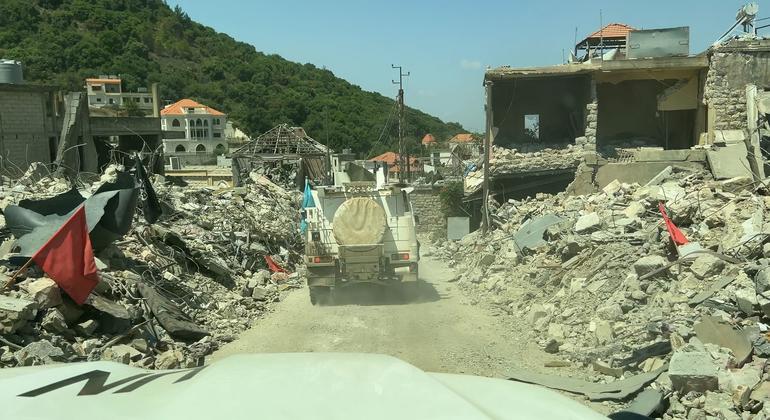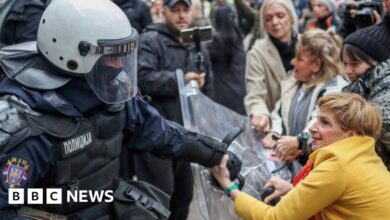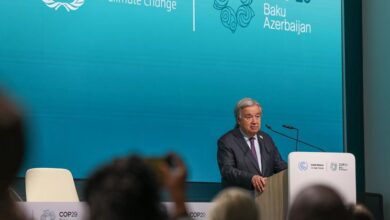Lebanon: WHO calls for more support for civilians as crisis grows


Dr Abdinasir Abubakar outlined how the UN agency is supporting Lebanon’s Ministry of Health, including tracking this week’s wave of electronic device explosions.
Hundreds of pagers exploded across the country on Tuesday, while walkie-talkies and even some solar panels exploded the following day. The attacks, believed to have targeted the militant group Hezbollah, killed civilians, including children.
Area ‘on the brink of destruction’
Speaking at a regular briefing for reporters in New York, Spokesperson Stephane Dujarric called for “maximum restraint” from all sides in the conflict.
“We are very concerned about the escalation of tensions. across the Green Line including the deadly attack we witnessed in Beirut today,” he added.
“We also call on all parties to immediately cease fire…This area is on the brink of disaster.“
An ‘unprecedented’ crisis
Dr. Abukakar said United Nations News As of Thursday evening, the Ministry of Health had recorded 37 deaths and more than 3,000 injuries.
WHO has been assisting hospitals in Lebanon in preparing for mass casualty events due to the instability in the region.
He described the past few days as “unprecedented”, both for the country and the health system, “because in just one moment on September 17, from about 3:30 to 4 p.m., nearly 3,000 injured patients were brought to the hospital, and in fact, the hospitals were not prepared to handle that number of cases at the same time”.
Support and supplies
After the blast, WHO supported the Ministry of Health to “work closely with hospitals to at least have a proper referral system,” he said.
“We work with emergency departments to make sure there is proper coordination within hospitals where patients can be transferred from one hospital to another.”
The teams also distributed and provided supplies that hospitals needed to handle cases, in addition to supporting the Lebanese Red Cross with supplies and testing kits suitable for blood transfusions.
WHO also provides other support, including mental health services for health workers, patients and families, as well as allowing essential health services to continue to operate.
Crisis after crisis
The crisis is the latest challenge for Lebanon, whose health system has been severely affected in recent years.
First, says Dr. Abubkar, COVID-19 pandemic, followed by a devastating explosion in August 2020 at the port in the capital Beirut. The blast killed more than 200 people and caused millions of dollars in damage.
Lebanon is also in financial turmoil and is suffering from the Gaza war that broke out last October following Hamas attacks on Israel, he added, with many hospitals dealing with cases of trauma from cross-border violence.
“Prior to the recent incident on September 17, there had been nearly 2,700 injuries and approximately 550 deaths due to the conflict.“, he noted.
WHO is also expanding operations in southern Lebanon, where mobile clinics run by partners provide immunization, primary health care and nutritional support to people displaced by fighting.
Preparing for mass casualty events
Dr Abubakar said WHO and the Lebanese Ministry of Health had invested heavily in the preparedness of hospitals and health facilities, including advanced training in trauma management, which proved invaluable after the wave of explosions that occurred earlier this week.
“We have put in place supplies. We have done some simulation exercises for this type of mass casualty event. I think some of those hospitals are actually prepared in the sense that they should at least expect this type of mass casualty event,” he said.
He praised health authorities for their “tremendous efforts” in coordinating, allowing overwhelmed or “saturated” hospitals to transfer patients to other locations.
“In total, more than 100 hospitals have received injured patients,” he said. “And you can imagine, in a small country like Lebanon, with five million people, when so many injured people are admitted in a very short time, how the health system feels.”
Support Lebanon Now
Asked if he had any message, Dr Abubakar stressed the need to respect international humanitarian law and protect health workers, civilians and health facilities.
He also called for more support for Lebanon, stressing the need for more resources to respond to the ongoing crisis “as well as the worst-case scenario”.
“I appeal to the international community that we need more resources to support the injured, the affected, the displaced in the current conflict,” he said.




